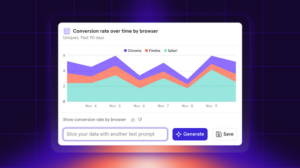Chat With Your Data: Mixpanel Integrates Generative AI to Simplify Analytics

Mixpanel, a platform for event analytics, announced it has integrated generative AI capabilities into its services to allow companies to “chat with their data.”
Using a new feature called Spark, Mixpanel users can now conduct a natural language chat with their data to receive immediate insights into customer experience and the impact of their product and marketing decisions.
“Generative AI is the next interface to computing, and it’s unlocking huge productivity gains,” said Amir Movafaghi, CEO of Mixpanel. “In our world, this means it’s much easier for anyone to query their data in plain English by asking the AI a question. Making analytics accessible, so literally everyone can participate, will significantly improve decision making across companies.”
Mixpanel’s goal is to make analytics less technical and more accessible to all users. The Mixpanel platform is based on event analytics where every action a user performs within a digital product like an eCommerce site or rideshare app is captured and used for analysis. The company says this granular view helps companies understand how different groups of users behave at various points during their experience. Traditional analytics and BI tools often require writing complex SQL queries which can leave non-technical users at the mercy of their (often very busy) data scientist colleagues when gaining insights.
“Mixpanel changed this with its event-based analytics system, which non-technical employees use to ask questions of their data with drop-down menus. The introduction of generative AI reimagines the data analytics process again, so anyone can use Mixpanel to support better decision making by easily asking questions of their data,” the company said in a release.

Mixpanel users can use text prompts to query data without writing a complex SQL query. (Source: Mixpanel)
Spark leverages OpenAI’s GPT-3.5 Turbo model, a smaller, more refined version of GPT-3. Users can ask business questions in plain English and the model constructs the necessary query, executes it in Mixpanel, and delivers a dashboard of the relevant data.
As an example of how this new feature can be used, a non-technical employee working for a rideshare platform might ask, “Which group of users most frequently convert when we apply surge pricing across our key markets?” Using this prompt, Spark can build the necessary query, execute it in Mixpanel, and return a relevant chart displaying conversion trends for different cohorts across different markets.
Inaccuracy via hallucination is a concern with large language models like GPT-3.5 Turbo which is said to have a hallucination rate between 15-20%. There are also privacy and security concerns when using LLMs with proprietary data.
Mixpanel is addressing these concerns with built-in features that allow users to check the source of the information given in a generated report. The company says it prioritizes privacy and that company data is not ingested by the LLM. The AI only builds queries and Mixpanel analyzes the underlying data, the company asserts.
“When Spark builds a report, it’ll be viewable and editable like any other report, meaning you can go into its query builder view and see details like what events are being used. From there, you can even add your own edits to the report to make modifications or improvements,” Movafaghi wrote in a blog post.
The company is also making its generative AI feature optional. Even though Spark will eventually be available to all users, customers can choose to keep using the existing Mixpanel interface. Spark will soon be available as part of a closed Beta program to select customers, but the company says it will be rolling it out as an optional interface to all Mixpanel users in the coming weeks.
“Generative AI is a bit like electricity, you can build it into other products to make things faster and easier. We’re using it to speed up workflows and simplify how people ask questions of their data. But this is just the start, and we expect LLMs will enhance analytics for years to come,” said Movafaghi.
This article first appeared on sister site Datanami.










